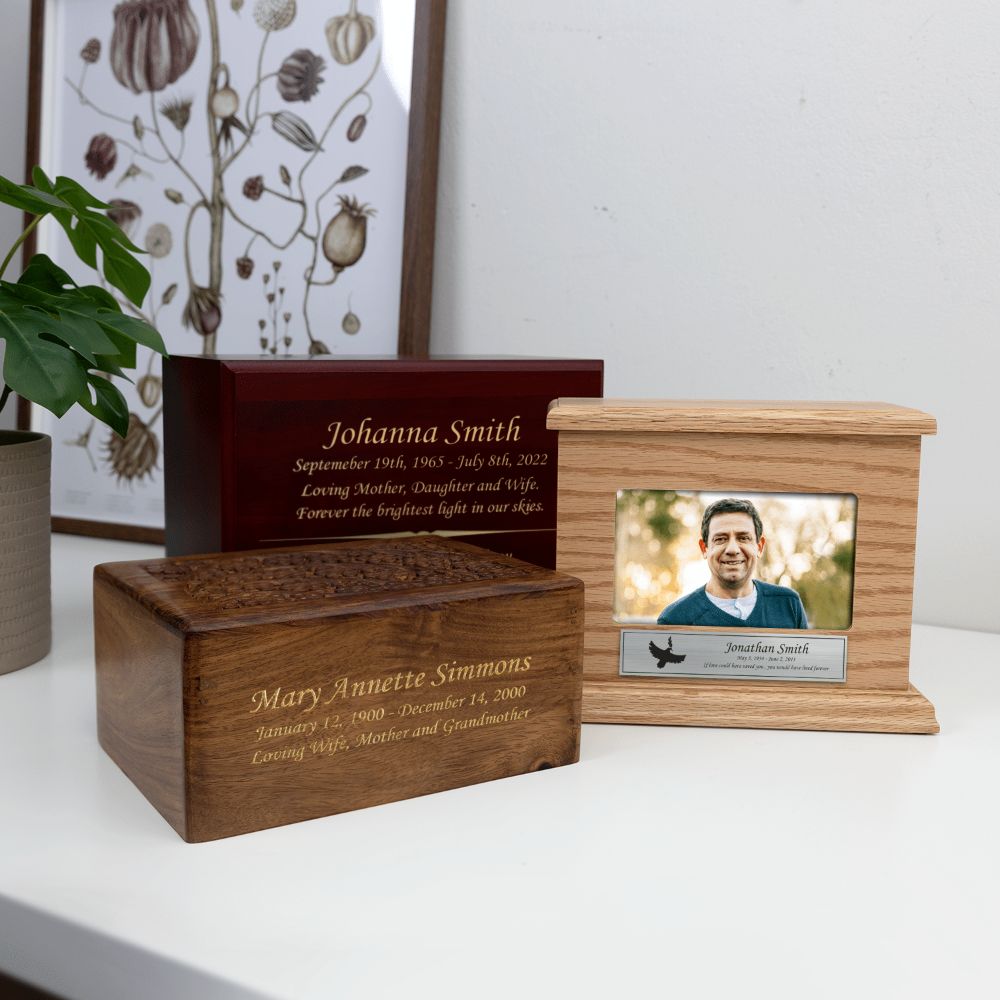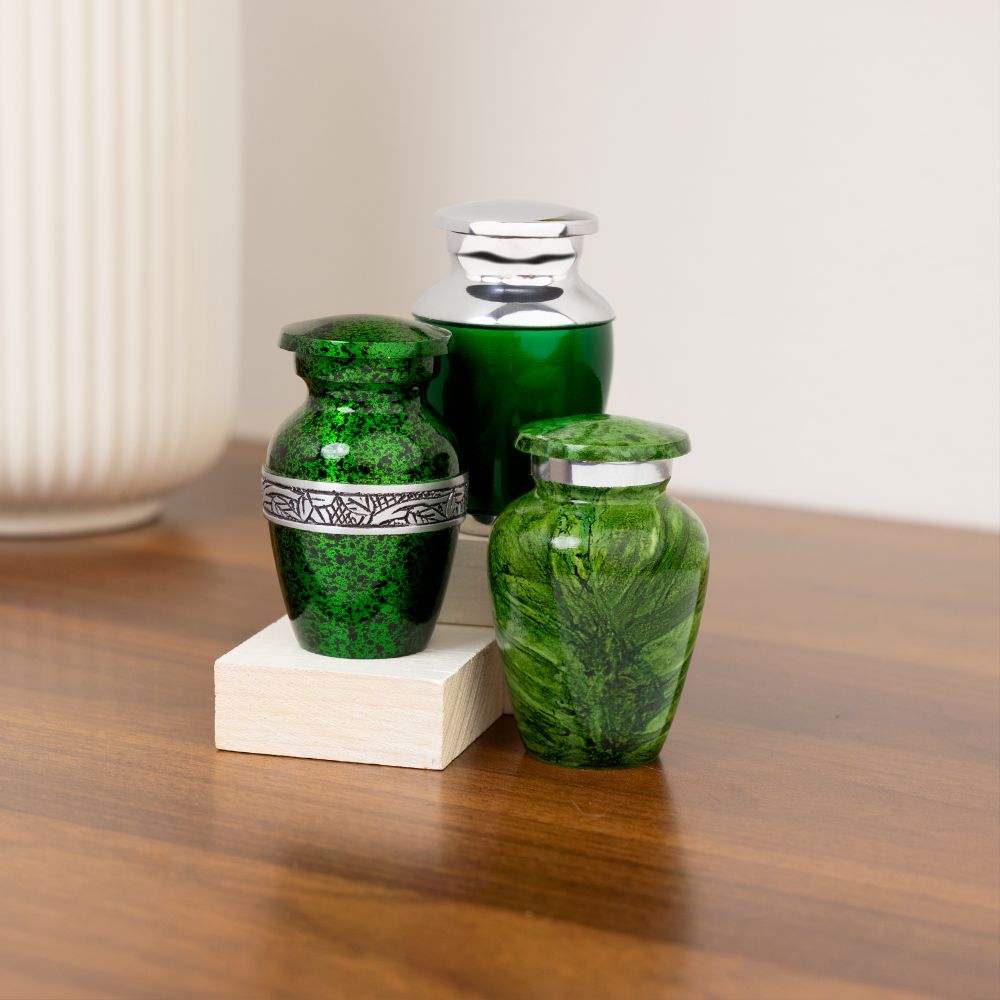All Articles & Guides / Cremation / How To Choode The Right Cremation Urn
How To Choose The Right Cremation Urn
With thousands of urns and so many options to choose from, you may wonder where to begin in deciding which cremation urn is best for you or your loved one. Here are some practical tips to guide you through the selection process.
How will the urn be used?
The primary purpose of a cremation urn, of course, is simply to hold the cremated remains of the deceased. But what will you do with the urn once it is filled with your loved one’s ashes? The answer to that question will determine the type of urn you need. To guide you in your selection, consider the following descriptions of the typical ways one might use a cremation urn:
- Keeping the urn at home
Displaying a cremation urn in a prominent place in your home is one way to show honor and respect toward your loved one. Keeping the urn at home is a tangible way to preserve memories of the deceased, and many families find comfort in the physical presence of their loved one’s ashes. Urns used for this general purpose can be made of varying materials such as metal, wood, composite resin or stone.
- Scattering ashes
Scattering urns feature a top opening designed to easily release the cremains. After scattering the ashes, the family may place keepsakes or flowers inside the scattering urn to memorialize their loved one.
- Water or natural burial
Biodegradable urns made from organic and recycled materials are designed to break down naturally when water or soil are introduced, rather than withstand the elements. Urns designed for water burials are completely water-soluble and made to sink and dissolve quickly. Another type of biodegradable urn is designed for land use, and may be buried in earth, displayed in the home, or inurned in a columbarium.
- Columbarium niche inurnment
Size is the most important consideration when choosing an urn for a columbarium niche. Be sure to find out the dimensions (height, width and depth) of the niche and choose an urn that will fit within that space. Another consideration is the material in which the urn is made from. Many mausoleums and cemeteries have guidelines that must be followed for what they will and will not allow in their facilities.
- In-ground Burial
Burial containers and urn vaults are designed to support the earth around the urn and keep the ground from sinking at the burial site. A burial container is typically made of steel, polymer, or polystyrene and designed as a rigid outer container for a cremation urn. The urn will be stored inside of the burial container to preserve the urn for eternity. When searching for a burial container, the inside urn dimensions are very important to consider to ensure the outside container will have the capacity to hold the purchased urn. Urn vaults serve a dual purpose as both an urn and burial container. Many families favor urn vaults for their affordability, and the attractive styling of urn vaults makes them suitable for display as well as burial.
- Sharing cremated remains among family members
Rather than entrusting the care of a loved one’s ashes to a single person, families may prefer to share the ashes among several family members by dividing the cremains into two or more keepsake or sharing urns. Many people also find comfort in their grief by keeping their loved one’s ashes close at heart by using cremation jewelry.
What size urn do you need?
After you’ve determined the type of cremation urn you need based on the way you will use the urn, the next step is to determine the volume the urn must have in order to hold your loved one’s ashes. A cremation urn’s volume is measured in cubic inches and refers to the amount of space inside the urn.
As a general rule for an adult urn, you’ll need an urn with at least one cubic inch of space for every pound of body weight prior to cremation. For example, if the deceased had a healthy weight of 150 pounds before cremation, you will need an urn that is at least 150 cubic inches or larger. If the measurements are very close or you’re just not sure which size to choose, we recommend selecting the larger size urn. If you are purchasing an urn for an infant, child or pet, refer to our sizing guide for more information and assistance.

Transferring Ashes Into An Urn
How do I move ashes into a cremation urn?
When you receive the cremation urn from the crematorium, your loved one’s ashes will be contained within a plastic bag inside the urn. The bag is designed to protect the cremains from spilling and other potential hazards, such as water. The bag also makes it easy to transfer the ashes from one urn to another. The cremains should always remain the the plastic bag, they should never be dumped or poured into a cremation urn. If you’re uncomfortable transferring the ashes yourself, you can bring the urns to a local funeral home or crematorium to be transferred. Funeral professionals are accustomed to such requests and will be happy to assist you.
Can I put my temporary cremation urn inside another urn?
We are often asked whether it’s possible to place a temporary cremation urn inside one of our urns. Most urns don’t have a large enough opening or internal space to accommodate another urn, and temporary urns aren’t designed to fit inside of another urn. Instead, we recommend that you transfer the plastic bag of ashes from the temporary urn to the new urn. Again, if you are uncomfortable transferring the bag yourself, you can bring the temporary urn along with the new urn to a local crematorium or funeral home for assistance.
Is this cremation urn too big?
The main concern, again, is to be sure the urn you purchase is large enough to hold your loved one’s ashes; beyond that, unless you are planning to keep the urn in a columbarium niche or other restricted space, there is really no such thing as an urn that is “too big.” Apart from these considerations, the size of the urn is simply a matter of personal preference.
Related Content





